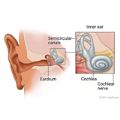Our Health Library information does not replace the advice of a doctor. Please be advised that this information is made available to assist our patients to learn more about their health. Our providers may not see and/or treat all topics found herein. A cochlear implant is a small electronic device that can help "make" sound if you have a certain type of severe hearing loss in both ears. The implant does the job of the damaged or absent nerve cells that in a normal ear make it possible to hear. Cochlear implants can be programmed according to your specific needs and degree of hearing loss. Unlike hearing aids, cochlear implants do not make sounds louder but improve how well you hear sound. A cochlear implant consists of a: The microphone picks up sound and sends it to the speech processor, which changes the sound to information the cochlear implant can understand. The implant then tells the nerves in the ear to send a message to the brain. The message is understood as sound. Cochlear implants have been shown to improve a person's ability to understand speech and speak clearly. Speech therapy will help you make the most of your cochlear implant. Training in listening, language, and speech-reading skills (paying attention to people's gestures, facial expressions, posture, and tone of voice) may also help you. Cochlear implants have a low rate of complications, which may include: Bacterial meningitis occurs more often in children with cochlear implants than in children the same age who do not have implants. The Centers for Disease Control and Prevention along with the Food and Drug Administration recommend the following: It is possible that a cochlear implant can be affected by a magnetic resonance imaging (MRI) scan. This could cause the implant to stop working. Before you or your child has an MRI, tell your doctor about the cochlear implant. Current as of: October 27, 2024 Author: Ignite Healthwise, LLC Staff Current as of: October 27, 2024 Author: Ignite Healthwise, LLC Staff Clinical Review Board This information does not replace the advice of a doctor. Ignite Healthwise, LLC disclaims any warranty or liability for your use of this information. Your use of this information means that you agree to the Terms of Use and Privacy Policy. Learn how we develop our content. To learn more about Ignite Healthwise, LLC, visit webmdignite.com. © 2024-2025 Ignite Healthwise, LLC.Topic Contents
Cochlear Implants
Treatment Overview
How does it work?
How Well It Works
Risks
Credits
Clinical Review Board
All Ignite Healthwise, LLC education is reviewed by a team that includes physicians, nurses, advanced practitioners, registered dieticians, and other healthcare professionals.
All Ignite Healthwise, LLC education is reviewed by a team that includes physicians, nurses, advanced practitioners, registered dieticians, and other healthcare professionals.
Our Health Library information does not replace the advice of a doctor. Please be advised that this information is made available to assist our patients to learn more about their health. Our providers may not see and/or treat all topics found herein. Current as of: October 27, 2024 Author: Ignite Healthwise, LLC Staff Clinical Review BoardCochlear Implants
All Ignite Healthwise, LLC education is reviewed by a team that includes physicians, nurses, advanced practitioners, registered dieticians, and other healthcare professionals.




